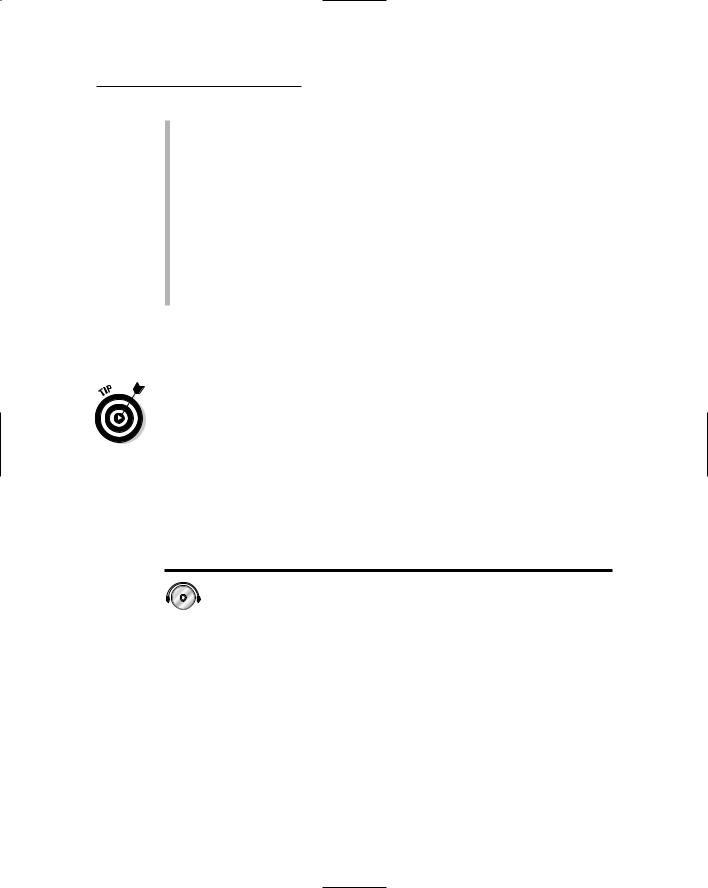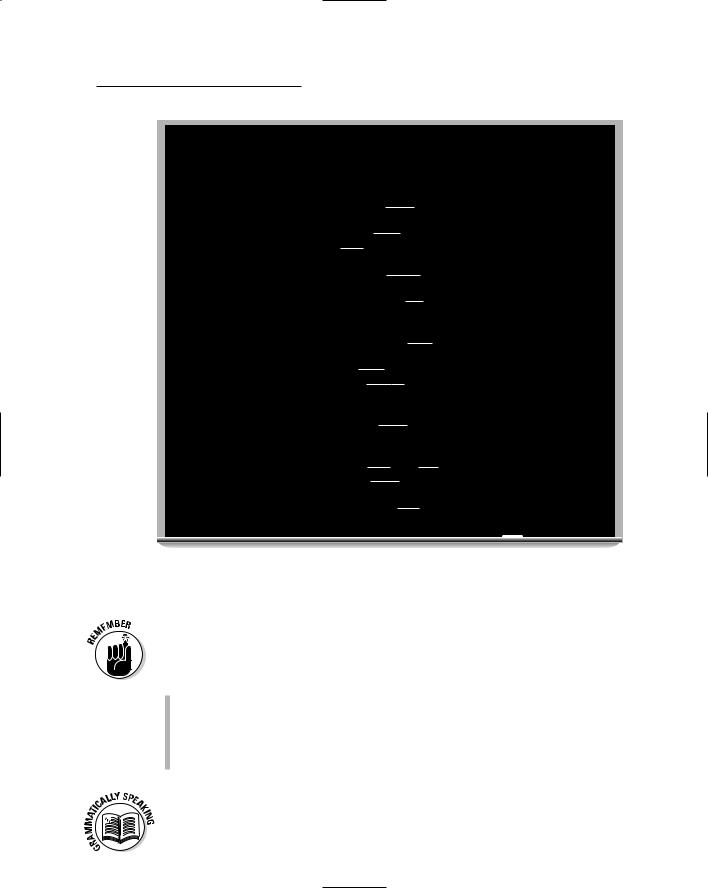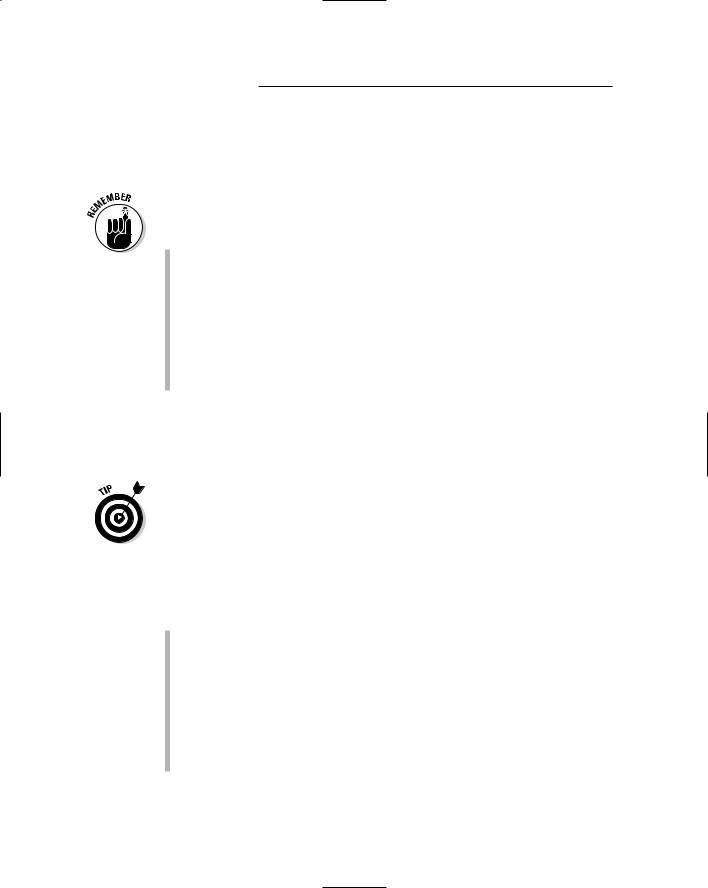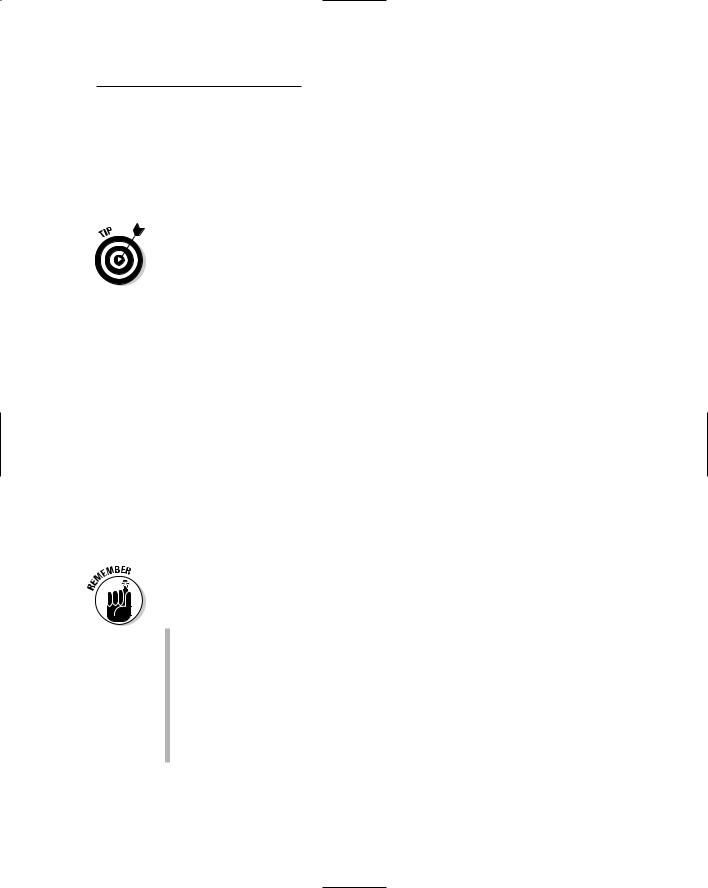
Russian For Dummies
.pdf
144 Part II: Russian in Action
On the quarter hour
To indicate a quarter after an hour, Russian typically uses the phrase pyatnadtsat’ minut (peet-naht-tsuht’ mee-noot; fifteen minutes). Using pyatnadtsat’ minut to indicate a quarter after the hour is easy. To say it’s 5:15, you just say Syejchas pyat’ chasov pyatnadtsat’ minut (see-chahs pyat’ chuh-sohf peet-naht-tsuht’ mee-noot; Literally: It’s five hours fifteen minutes). To be more conversational, you can drop chasov and minut and say Syejchas pyat’ pyatnadtsat’ (see-chahs pyat’ peet-naht-tsuht’; It’s 5:15).
To indicate a quarter to an hour is a little trickier. In this situation, Russian uses the word byez (byes; without) with pyatnadtsati and the hour, as in
Syejchas byez pyatnadtsati pyat’ (see-chahs bees peet-naht-tsuh-tee pyat’; It’s 4:45, Literally: It’s five without fifteen minutes). The pronounciation of byez changed in the sentence because it’s followed by a word beginning with the devoiced consonant p (see Chapter 2 for details on devoiced consonants).
If you feel brave and want to use the word chyetvyert’ (chyet-veert’; quarter) to talk about 15-minute increments, then you need to do one of the following:
If it’s a quarter past an hour, use the genitive case of the ordinal number corresponding to the next hour. For example: Syejchas chyetvyert’ syed’- mogo (see-chahs chyet-veert’ seed’-moh-vuh; It’s a quarter past six, Literally: A quarter of the seventh hour has passed).
If it’s a quarter to an hour, use the phrase byez chyetvyerti (bees chyet- veer-tee), as in Syejchas byez chyetvyerti vosyem’ (see-chahs bees chyet-veer-tee voh-seem’; It’s a quarter to eight, Literally: It’s eight minus a quarter).
Other times before or after the hour
To state times that aren’t on the half or quarter hour, you can simply use the construction Syejchas . . . chasa (or chasov) + . . . minut, as in Syejchas chyetyrye chasa dyesyat’ minut (see-chahs chee-tih-ree chuh-sah dye-seet’ mee-noot; It’s 4:10.) For more conversational speech, you can also drop the words chasa (or chasov) and minut and just say Syejchas chyetyrye dyesyat’ (see-chahs chee-tih-ree dye-seet’).
To express times right before the hour, you use the construction Syejchas byez plus the numbers indicating the minutes and the next hour. “It’s ten to five” is Syejchas byez dyesyati pyat (see-chahs bees dee-see-tee pyat’; Literally: It’s five minus ten minutes). In this construction, it’s common to drop the words minut (minutes) and chasov (hours) after the numerals indicating the time.
When using this expression, you must always remember to put the numeral after the word byez into the genitive case. Here are the genitive case forms of the numerals you most often use with this expression:

Chapter 7: Going Out on the Town, Russian-Style 145
odnoj (ahd-nohy; one)
dvukh (dvookh; two)
tryokh (tryokh; three)
chyetyryokh (chee-tih-ryokh; four)
pyati (pee-tee; five)
dyesyati (dee-see-tee; ten)
pyat’nadtsati (peet-naht-tsuh-tee; fifteen)
dvadtsati (dvaht-tsuh-tee; twenty)
dvadtsati pyati (dvuht-tsuh-tee pee-tee; twenty-five)
Asking for the time
To ask what time it is, you say Skol’ko syejchas vryemyeni? (skohl’-kuh see- chahs vrye-mee-nee; What time is it?) If you ask a passerby in public, you may want to begin this question with the polite phrase Izvinitye pozhalujsta . . .
(eez-vee-nee-tee pah-zhahl-stuh; Excuse me, please . . .) or Skazhitye pozhalujsta . . . (skuh-zhih-tee pah-zhahl-stuh; Could you please tell me . . .)
To ask at what time something will happen or has happened, use the phrases Kogda (kahg-dah; when) or V kakoye vryemya . . . (f kuh-koh-ee vrye-mye . . .
; At what time . . .)
Talkin’ the Talk
John went downtown today but left his watch at home. He needs to find out what time it is and asks a very pretty dyevushka (dye- voosh-kuh; young woman) who happens to be passing by if she can tell him the time.
John: |
Dyevushka, izvinitye pozhaluysta, vy nye skazhyetye |
|
skol’ko syejchas vryemyeni? |
|
dye-voosh-kuh eez-vee-nee-tee pah-zhahl-stuh vih |
|
nee skah-zhih-tee skohl’-kuh see-chahs vrye-mee-nee? |
|
Excuse me, miss, can you tell me what time it is? |
Dyevushka: Syejchas? Syejchas byez chyetvyerti chas. see-chahs? see-chahs bees chyet-veer-tee chahs Time? It’s quarter to one.

146 Part II: Russian in Action
John: |
Skol’ko? Prostitye ya nye ponyal. Ya inostranyets. |
|
skohl’-kuh? prah-stee-tee ya nee poh-neel. ya ee-nah- |
|
strah-neets |
|
What time? Sorry, I did not understand. I am a foreigner. |
Dyevushka: |
Syejchas byez pyatnadtsati minut chas. Vot chasy, |
|
posmotritye. |
|
see-chahs bees peet-naht-tsuh-tee mee-noot chahs. |
|
voht chuh-sih, puhs-mah-tree-tee. |
|
It is fifteen minutes to one. Here is my watch, take a |
|
look. |
John: |
A, ponyatno. Oj, ya dolzhyen byt’ na vstryechye v |
|
chas tridtsat’ v ryestoranye “Vostok”! Ya |
|
opazdyvayu. |
|
ah pah-nyat-nuh. ohy ya dohl-zhihn biht’ nuh fstrye- |
|
chee f chahs treet-tsuht’ v rees-tah-rah-nee vahs-tohk. |
|
ya ah-pahz-dih-vuh-yu! |
|
Oh, I see. Oh, I have to meet somebody at the restau- |
|
rant “Vostok” at 1:30. I am running late. |
Dyevushka: |
Oj, eto ryadom. U vas vstryecha v polovinye vtorogo? |
|
Tuda idti pyatnadtsat’ minut. Vy tam budyetye v |
|
chas. |
|
ohy eh-tuh rya-duhm. oo vahs fstrye-chuh f puh-lah- |
|
vee-nee ftah-roh-vuh? too-dah eet-tee peet-naht- |
|
tsuht’ mee-noot. vih tahm boo-dee-tee f chahs. |
|
Oh, it’s close by. Do you have a meeting at half past |
|
one? It’s a 15-minute walk. You’ll be there at 1. |
John: |
Bol’shoye vam spasibo, dyevushka. |
|
bahl’-shoh-ee vahm spuh-see-buh dye-voosh-kuh. |
|
Thank you so much, miss. |
|
|

Chapter 7: Going Out on the Town, Russian-Style 147
Words to Know
Vy nye skazhyetye? |
vih nee skah-zhih-tee |
Can you tell me? |
Prostitye ya nye |
prah-stee-tee ya nee |
Sorry, I did not |
ponyal. |
poh-neel |
understand. |
inostranyets |
ee-nah-strah-neets |
foreigner |
Vot chasy. |
voht chuh-sih |
Here is (my) |
|
|
watch. |
Posmotritye. |
puh-smah-tree-tee |
Take a look. |
Ya dolzhyen byt’ |
ya dohl-zhihn biht’ |
I have to be at a |
na vstryechye. |
nuh fstrye-chee |
meeting/to meet |
|
|
somebody. |
Ya opazdyvayu. |
Ya ah-pahz-dih- |
I’m running late. |
|
vuh-yoo |
|
Tuda idti . . . minut. |
too-dah eet-tee . . . |
It’s a . . . minute |
|
mee-noot |
walk. |
Vy tam budyetye v |
vih tahm boo- |
You’ll be there at |
|
dee-tee v |
|
Knowing the times of the day
People all over the world seem to agree on three main time periods: utro (oo- truh; morning), dyen’ (dyen’; afternoon), and vyechyer (vye-cheer; evening). Noch’ (nohch; night) is the time when most people sleep. To state that something happens within these time periods, use these phrases:
utrom (oo-truhm; in the morning)
dnyom (dnyom; in the afternoon)
vyechyerom (vye-chee-ruhm; in the evening)
noch’yu (nohch-yu; late at night or early in the morning)
While English uses the prepositional phrase “in + time of the day” to indicate times of the day, in Russian you put the words utro, dyen’, vyechyer, and noch’ in instrumental case. (For more on instrumental case, see Chapter 2.) Also note that the word dyen’ drops the letter ye in the process and becomes

148 Part II: Russian in Action
dnyom rather than denyom. Nouns sometimes have this habit of “losing” letters in the process of declining for cases in Russian.
Distinguishing the days of the week
To indicate days of the week, use these Russian words:
ponyedyel’nik (puh-nee-dyel’-neek; Monday)
vtornik (ftohr-neek; Tuesday)
sryeda (sree-dah; Wednesday)
chyetvyerg (cheet-vyerk; Thursday)
pyatnitsa (pyat-nee-tsuh; Friday)
subbota (soo-boh-tuh; Saturday)
voskryesyen’ye (vuhs-kree-syen’-ee; Sunday)
If somebody asks you what day of the week it is, he says: Kakoj syegodnya dyen’? (kuh-kohy see-vohd-nye dyen’; What day is it today?) To answer this question, you say Syegodnya plus the day of the week. For example:
Syegodnya ponyedyel’nik (see-vohd-nye puh-nee-dyel’-neek; It’s Monday today). It’s that simple!
Note that while in English the words indicating days of the week are written with capital letters, in Russian they aren’t.
To say that something happens, happened, or will happen on a certain day, you need to add the preposition v, and you put the word denoting the day of the week into the accusative case. (For more on cases, see Chapter 2.)
As a result, the phrases you use are the following:
v ponyedyel’nik (f puh-nee-dyel’-neek; on Monday)
vo vtornik (vah ftohr-neek; on Tuesday)
v sryedu (f srye-doo; on Wednesday)
v chyetvyerg (f cheet-vyerk; on Thursday)
v pyatnitsu (f pyat-nee-tsuh; on Friday)
v subbotu (f soo-boh-too; on Saturday)
v voskryesyen’ye (v vuhs-kree-syen’-ee; on Sunday)

Chapter 7: Going Out on the Town, Russian-Style 149
You may wonder why some of the days change in the accusative case, while others don’t. The explanation is simple: Masculine nouns denoting inanimate objects don’t change their form in accusative case and retain their nominative (dictionary) form. You may also wonder why the word vtornik is used with the preposition vo rather than v as other days of the week do. Well, mostly for phonetic reasons: It’s very hard (even for Russians!) to pronounce v with the word that also begins with the sound v. The sounds get glued to each other in the process of speaking and it’s hard to understand whether the person speaking is saying “on Tuesday” or just “Tuesday.” You use vo, however, only if the stress of the following word falls on the first syllable. That’s why we can use v rather than vo when we say v voskryesyen’ye (on Sunday).
Other phrases related to the days of the week include
dyen’ (dyen’; day)
syegodnya (see-vohd-nye; today)
syegodnya utrom (see-vohd-nye oo-truhm; this morning)
syegodnya vyechyerom (see-vohd-nye vye-chee-ruhm; this evening)
nyedyelya (nee-dye-lya; week)
Talking about time relative to the present
Just as in English, Russian has lots of phrases to talk about a certain time in the past or future that relates to the present moment. Some time-related words that you may hear or say often in Russian are
syejchas (see-chahs; now)
skoro (skoh-ruh; soon)
pozdno (pohz-nuh; late)
pozzhye (poh-zheh; later)
rano (rah-nuh; early)
ran’shye (rahn’-sheh; earlier)
vchyera (vchee-rah; yesterday)
pozavchyera (puh-zuhf-chee-rah; the day before yesterday)
zavtra (zahf-truh; tomorrow)
poslyezavtra (poh-slee-zahf-truh; the day after tomorrow)
If you want to express that something will happen in a week, a month, or a year, you use chyeryez plus the accusative form of either nyedyelya (nee- dye-lya; week), myesyats (mye-seets; month), or god (goht; year):

150 Part II: Russian in Action
chyeryez nyedyelyu (cheh-reez nee-dye-lyu; in a week)
chyeryez myesyats (cheh-reez mye-seets; in a month)
chyeryez god (cheh-reez goht; in a year)
To say that something happened last week, month, or year, you say
na proshloj nyedyele (nuh prohsh-luhy nee-dye-lee; last week)
v proshlom myesyatsye (v prohsh-luhm mye-see-tseh; last month)
v proshlom godu (v prohsh-luhm gah-doo; last year)
Together Wherever We Go:
Making Plans to Go Out
It’s always more fun to go out on the town with friends. In the following sections, we give you all the words and expressions you need to invite your friends out with you, and we tell you how to accept or decline invitations you receive. We also tell you how to find out what time an event starts.
Do you want to go with me?
Here are common phrases people use to invite you to do things with them:
Pojdyom v . . . (pahy-dyom v; Let’s go to the . . .; informal)
Pojdyomtye v . . . (pahy-dyom-tee v; Let’s go to the . . .; formal or plural)
Davaj pojdyom v . . . (duh-vahy pahy-dyom v; Let’s go to the . . .; informal)
Davajtye pojdyom v . . . (duh-vahy-tee pahy-dyom v; Let’s go to the . . .; formal or plural)
Ty khochyesh’ pojti v . . . (tih khoh-cheesh’ pahy-tee v; Do you want to go to the . . .; informal)
Vy khotitye pojti v . . . (vih khah-tee-tee pahy-tee v; Do you want to go to the . . .; formal or plural)
To express “Do you want to . . . ,” you say either Vy khotitye . . . (vih khah- tee-tee; Do you want to . . .; formal) or Ty khochyesh’ . . . (tih khoh-cheesh; Do you want to . . .; informal) plus a verb infinitive. For example, the informal version of “Do you want to watch a movie?” is Ty khochyesh’ smotryet’ film’?

Chapter 7: Going Out on the Town, Russian-Style 151
(tih khoh-cheesh smah-tret’ feel’m). The formal version of “Do you want to play soccer?” is Vy khotitye igrat’ v futbol? (vih khah-tee-tee ee-graht v foot-bohl). For more on infinitives, see Chapter 2.
Don’t forget to use the formal form of you (vy) when inviting somebody you don’t know too well to do something. For more info, see Chapter 3.
Davaj/davajtye is not only an invitation formula but also a very useful construction in almost any social situation. You can use it to suggest doing something: Davajtye zakroyem okno (duh-vahy-tee zuhk-roh-eem ahk-noh; Let’s close the window). It’s also an easy way to agree to do something with a good deal of enthusiasm: Davaj pojdyom v kino! — Davaj! (dah-vahy pahy-dyom v kee-noh — dah-vahy; Let’s go to the movies — Sure, let’s do it!) Some young Russians even use it as an informal “good-bye”: Nu, davaj! (noo dah-vahy; Take care, see you later!)
To let everybody around know that you want to go somewhere tonight, you may say Ya khochu pojti v . . . syegodnya vyechyerom (ya khah-choo pahy- tee f . . . see-vohd-nye vye-chee-ruhm; I want to go to . . . tonight).
To make plans to go somewhere on a certain day of the week, you can use either Davaj/davajtye pojdyom . . . or Ya khochu pojti v . . . + one of the expressions denoting days of the week, which we cover earlier in this chapter. For example, “I want to go to the movies on Thursday” would be Ya khochu pojti v kino v chyetvyerg (ya khah-choo pahj-tee f kee-noh f cheet-vyerk).
After you ask someone to make plans with you (or after someone asks you), the big question is whether to decline or accept. We cover both options in the following sections.
Declining an invitation
Russians don’t easily take nyet for an answer! So if you need to decline an invitation, we recommend softening your response with one of the following:
K sozhalyeniyu, ya nye mogu (k suh-zhuh-lye-nee-yu ya nee mah-goo; Unfortunately, I can’t)
Ochyen’ zhal’, no ya v etot dyen’ zanyat (oh-cheen’ zhahl’ noh ya v eh- tuht dyen’ zah-neet; I am very sorry, but I am busy that day)
Mozhyet byt’, v drugoj dyen’? (moh-zhiht biht’ v droo-gohy dyen’; Maybe on a different day?)
Mozhyet, luchshye pojdyom v kafye? (moh-zhiht looch-shih pahy-dyohm f kah-feh; Maybe we could go to a coffee shop instead?)

152 Part II: Russian in Action
Accepting an invitation
Here are some ways to spice up your da:
Spasibo, s udovol’stviyem! (spah-see-buh s oo-dah-vohl’-stvee-eem; Thank you, I would be happy to!)
Bol’shoye spasibo, ya obyazatyel’no pridu. (bahl’-shoh-ee spuh-see-buh, ya ah-bee-zah-teel’-nuh pree-doo; Thank you very much, I’ll come by all means.)
Spasibo, a kogda? Vo skol’ko? (spah-see-buh ah kahg-dah? vah skohl’- kuh?; Thank you, and when? What time?)
What time does it start?
If you want to know when an event (such as a movie or a performance) begins, this is how you ask: Kogda nachinayetsya . . . ? (kahg-dah nuh-chee- nah-eet-sye; When does . . . start?) The event you’re asking about goes into the nominative case. (Check out Chapter 2 for more about cases.) For example, “When does the film start?” would be Kogda nachinayetsya fil’m? (kahg- dah nuh-chee-nah-eet-sye feel’m)
When talking about event start times, the verb “to start/to begin” is indispensable. Here’s how you translate it into Russian:
If the verb “to start/to begin” has an object, translate it into Russian as nachinat’, as in My nachinayem fil’m (mih nuh-chee-nah-eem feel’m; We are beginning the show). The object must go into the accusative case.
If the verb “to start/to begin” doesn’t have an object, translate it as nachinat’sya, as in Fil’m nachinayetsya v chyetyrye tridtsat’ (feel’m nuh-chee-nah-eet-sye v chee-tih-ree treet-tsuht’; The show begins at 4:30).
The verb nachinat’sya is called a reflexive verb. Reflexive verbs end in -sya or -s’ and don’t take direct objects because their action refers back to the subject of the sentence. In the phrase Fil’m nachinayetsya v . . . , what you’re really saying is “The movie starts itself up at . . .” Other common reflexive verbs are otrkyvatsya (uht-krih-vaht-sye; to open) and zakryvatsya (zuh-krih- vaht’-sye; to close). See Chapter 6 for more about reflexive verbs.
On the Big Screen: Going to the Movies
Going to see a fil’m (feel’m; movie) in Russia may be kind of challenging because most Russian movies are — you guessed it! — in Russian. Unless you just want to enjoy the music of the language or pick up some phrases and

Chapter 7: Going Out on the Town, Russian-Style 153
words here and there, your best bet is to rent Russian movies with subtitles or find a kino (kee-noh; theater) that features movies with subtitles. If, however, you want to check out a real Russian film, in the following sections we show you different types of movies, how to buy a ticket, and how to find your seat at the movie theater.
Whereas English just uses the word “theater” for a movie theater, Russian is more exact in expressing the difference between a movie theater and a play, opera, or ballet theater. The word kino (kee-noh) or the more formal kinotyeatr (kee-nuh-tee-ahtr) are the only words you can use to denote “movie theater” in Russian.
Picking a particular type of movie
Check out the following list for the names of different film genres in Russian:
dyetyektiv (deh-tehk-teef; detective film)
ekranizatsiya khudozhyestvyennoj lityeratury (eh-kruh-nee-zah-tsih-ye khoo-doh-zhihs-tvee-nuhy lee-tee-ruh-too-rih; screen version of a book)
fil’m uzhasov (feel’m oo-zhuh-suhf; horror film)
komyediya (kah-mye-dee-ye; comedy)
mul’tfil’m (mool’t-feel’m; cartoon)
myuzikl (m’yu-zeekl; musical)
nauhcnaya fantastika (nuh-ooch-nuh-ye fuhn-tahs-tee-kuh; science fiction)
priklyuchyenchyeskij fil’m (pree-klyu-chyen-chees-keey feel’m; adventure film)
trillyer (tree-lyer; thriller)
vyestyern (vehs-tehrn; western)
What genres do Russains prefer? It’s hard to generalize. We should mention one thing, though: Russians don’t seem to like happy endings as much as most Americans do, and they tend to prefer harsh reality to beautiful dreams in their movies.
Buying tickets
If you decide to go to the movies, you need a bilyet (bee-lyet; ticket). The ticket office is generally somewhere near the entrance to the movie theater. Most likely it has a sign that says Kassa (kah-suh; ticket office) or Kassa kinotyeatra (kah-suh kee-nuh-tee-aht-ruh; Literally: ticket office of the movie theater).
